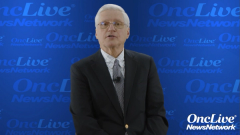
Current Treatment Options for Patients with NSCLC
Mark G. Kris, MD, FASCO shares an overview of existing treatment options for patients with stage I-III non-small cell lung cancer.
Current Treatment Options for Patients with NSCLC
Mark G. Kris, MD, FASCO: My name is Mark Kris and I am attending physician in Thoracic Oncology at Memorial Sloan Kettering Cancer Center in New York.
So, one of the most rewarding parts of being a medical oncologist is taking part in the care of patients with early stage lung cancer stages one to three. Here we have the chance to really impact the life of the patient by effectively treating the cancer we can not only treat the symptoms prolong life, but we have the chance to cure the patient, which is something that we really want to do beyond anything else as a goal of care. We have today, many tools to try to achieve that goal of cure. I think first and foremost, we need to give a what they call definitive local treatment. That's a treatment that would completely eradicate the cancer that you visualize that is present in the body, it can be done either with an operation surgery, or it can be done with simultaneous chemotherapy and radiation. Both are effective, there are generally no clinical trials that say one's better than the other. But I think it's clear that both can work. The way that a decision is made, on which one of these treatments to undertake is pretty straight forward. And that is a discussion among all the people that could be involved in the care of the patient, primarily, the medical oncologist, the thoracic surgeon, and the thoracic radiation oncologist. Putting your minds together, coming up with the best plan of care is the way to do it. For people with the smallest tumors, and without any evidence of spread within the chest generally surgery is the local treatment that's given. For patients that surgery is dangerous because of a medical condition, or surgery can't be accomplished because of the location of the cancer radiation is chosen. While these treatments are very effective, they're not effective in every single patient. So, in addition to either simultaneous chemotherapy and radiation, or surgery, we add in other treatments, the most standard is chemotherapy. For decades now we've known that chemotherapy can help increase the chance of cure. And it's given generally for patients though with the more advanced stages of disease. And recently, we have seen the addition of immunotherapeutics either given before surgery, after radiation, or after surgery. So, it becomes better now but more difficult. We have to decide which treatment to give first, which treatment should be given together, the optimal sequencing, and it does require a lot more time and thought by all the care team. But the bottom line is, by putting together systemic therapies like chemo or immunotherapy, the best surgery that we can deliver, and the best radiation that we can deliver, we can do the best job for our patients.
The decision on whether or not to recommend adjuvant therapy and I'm going to narrow that to therapy after a complete operation-- a complete removal of the cancer. It's generally done by risk. What is the risk that the cancer will return? And that risk is biologically determined by the extent of cancer at the time of surgery, the pathology review of the material that the surgeon removes. I'm probably a bit more when should I say a proponent of recommending or at least considering adjuvant therapy and every single patient with lung cancer. Now for some of them, risk may outweigh benefit, but I think it needs to be on the table for everybody.
The short answer for me is that every patient is a candidate for adjuvant therapy, but it's all about that one patient balancing risk and benefit.





































